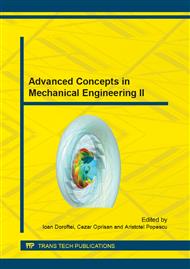p.195
p.201
p.205
p.211
p.217
p.223
p.231
p.237
p.243
Researches Regarding the Use of Bioethanol at the Supercharged Spark Ignition Engine
Abstract:
The general objective of the researches is use of bioethanol at the supercharged spark ignition engine for improving engine efficiency, improving performance of power and torque and decreasing of the emissions level. Bioethanol is a very good alternative fuel for supercharged SI engines because of its better combustion proprieties comparative to the gasoline; it has a higher combustion velocity, a high resistance to the combustion with knock and can be used and as a cooling agent of the intake air. By achieving these specific objectives this paper brings important contributions to improvement the SI engines performance. The paper presents results of some theoretical and experimental investigations on a 1.5 L supercharged SI engine fuelled with gasoline-bioethanol blends. At the theoretical research, the physical – mathematical model uses a Vibe combustion formal law and for combustion with knock avoiding the combustion duration is established shorter than end-gas auto ignition delay evaluated by Douaud and Evzat equation. Is established an optimum correlation between the engine air boost pressure, spark ignition timing, dosage, air boost temperature and energetic performance for to the avoiding of knocking phenomena. The theoretical and experimental investigations show that the improvement of the combustion process by use the bioethanol at the supercharged spark ignition engine leads to the reduction of BSFC (with 5% at the stoichiometric dosage), to the accentuated reduction CO and HC (with 5% and 13% respectively at the same dosage), due to a lower C content and better combustion properties of the bioethanol. In same time, the NOx emissions level significantly decreases (with 7% at the same dosage) because of the local cooling effect produced by bioethanol vaporization.
Info:
Periodical:
Pages:
217-222
DOI:
Citation:
Online since:
October 2014
Keywords:
Price:
Сopyright:
© 2014 Trans Tech Publications Ltd. All Rights Reserved
Share:
Citation:


